David Harsanyi discusses the named (by the mainstream media) culprits for the unexpected drop in US fourth-quarter GDP:
So, U.S. consumer confidence unexpectedly plunged in January to its lowest level in more than a year. The U.S. economy unexpectedly posted a contraction in the fourth quarter of 2012 — for the first time since the recession — “defying” expectations that economic growth is in our future.
If the economy were as vibrant as President Barack Obama has told us it is, a belt tightening in a single sector of government surely wouldn’t be enough to bring about “negative growth.” But one did. Unexpectedly. No worries, though. Pundits on the left tell us that this contraction was good news — possibly the best contraction in the history of all contractions. The White House blamed Republicans and, I kid you not, corporate jet owners because — well, who else? But mostly, the left is bellyaching about the end of temporary military spending and a brutal austerity that’s enveloped a once great nation.
There’s a small problem with that argument. There is no austerity. In the fourth quarter of 2012, Washington spent $908 billion, which was $30 billion more than it spent in the last quarter of 2011 and nearly $100 billion more than it spent in the third quarter of 2012. Taxpayers took on another $400 billion in debt during the quarter. If this is poverty, can you imagine what robust spending looks like?
As always, for “austerity” to take the blame, there’d actually have to have been some austerity to start with. The US government certainly hasn’t been practicing austerity over the last four years.




